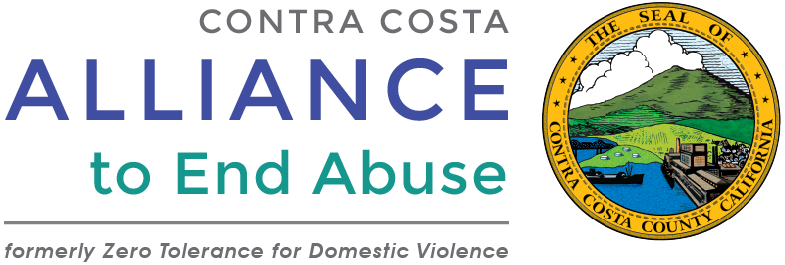
MARTINEZ, Calif. (June 9, 2021) – The Contra Costa Alliance to End Abuse recently reconvened its Domestic Violence (DV) Death Review Team for the first time in 15 years, and released its report (covering 2010-2019) that reveals surprising facts about the victims and suspects of deadly domestic violence in Contra Costa County. It also identifies a specific warning sign that could save lives.
Facts
Between 2010 and 2019, there were 86 domestic violence-related deaths in Contra Costa County. Seventy-two of these were homicides, representing 11 percent of the County’s total homicides during that period. Fourteen deaths were suicides. The leading cause of death was by gunshot wound (63%), followed by stabbing (16%) and blunt-force trauma (9%).
Of the 47 male victims, 14 were killed by a female suspect who, in many cases, killed her abuser after a severe incident. Thirty-four of the 39 female victims died at the hands of a male suspect. These deaths occurred across a wide range of ages, races, and cities of residence, indicating that simple demographics are not a reliable predictor of who might be at risk.
Key Indicators
The report revealed that non-fatal strangulation (choking) is a key predictor for subsequent DV homicide, increasing the odds by more than seven times that the survivor’s abuser will eventually kill him/her/them.
While the suspect-victim relationship is most often described as a current or former intimate partnership, the numbers include instances of family violence as well. Twenty of the suspects were related to their victims in some way. Ten were the victims’ own children. Two of the suspects were the victims’ parents.
The most dangerous time for victims is when they are attempting to leave an abusive relationship. Ten of the cases documented in the report involved active or previous restraining orders, and three involved divorce filings. However, of the 86 victims identified in the report, only one had completed a danger assessment through the county’s Lethality Assessment Program (LAP).
How to Get Help and Pandemic
As COVID-19 restrictions lift and more DV victims seek to leave their situations, awareness and action become especially urgent. To get help:
STAND! For Families Free of Violence
www.standffov.org
Crisis Line (888) 215-5555
Contra Costa County Family Justice Center
www.cocofamilyjustice.org
Richmond (West) (510) 974-7200
Concord (Central) (925) 521-6366
Antioch (East) (925) 281-0970
View a comprehensive list of resources.
The reporting period of 2010-2019 precedes the COVID-19 pandemic. A recent analysis by the National Commission on COVID-19 and Criminal Justice found that DV incidents rose by more than eight percent in the United States after the imposition of pandemic lockdowns. Because many victims do not report DV incidents, and because of increased isolation over the past year, this number could easily be larger.
Recommendations
The Domestic Violence Death Review Team notes that data reveal a clear need to direct more funding toward the development and implementation of danger assessments, intervention, prevention and support services, as well as more uniformity and training regarding the Domestic Violence Restraining Order (DVRO) process. The team also recommends immediate support services for children who have lost a parent to domestic violence (whether or not the child was present at the time), as well as for the first responders handling DV-related homicide and suicide calls. See the Contra Costa Alliance to End Abuseproject page to view the complete DV Reportand a one-page summary.
Current Projects
In partnership with local law enforcement and service providers, Contra Costa County is taking a three-fold approach to reducing the risk of DV homicide:
- Lethality Assessment Program (LAP): Uses evidence-based screening to identify DV victims at the highest risk of being seriously injured or killed by their partners, and immediately connects them with supportive services.
- Domestic Violence Multidisciplinary Team: Reviews high-risk cases on a monthly basis, with permission from the survivor.
- Strangulation Task Force: Raises awareness among survivors and potential victims and advises them of the services available to them.
Contra Costa Alliance to End Abuse
The Contra Costa Alliance to End Abuse, a public/private partnership founded by the Contra Costa County Board of Supervisors and led by a division of the Employment & Human Services Department (EHSD). The Alliance is committed to ending interpersonal violence in Contra Costa County and works with a wide range of agencies to put in place a variety of programs, projects and strategies to help keep community members out of harm’s way. The office’s goal is to propel a systematic change that ends all types of interpersonal violence, whether it be domestic and sexual violence or human trafficking. The Alliance is dedicated to keeping the residents of Contra Costa County safe through the development and implementation of innovative services and activities. To learn more, visit The Alliance website.
# # #

